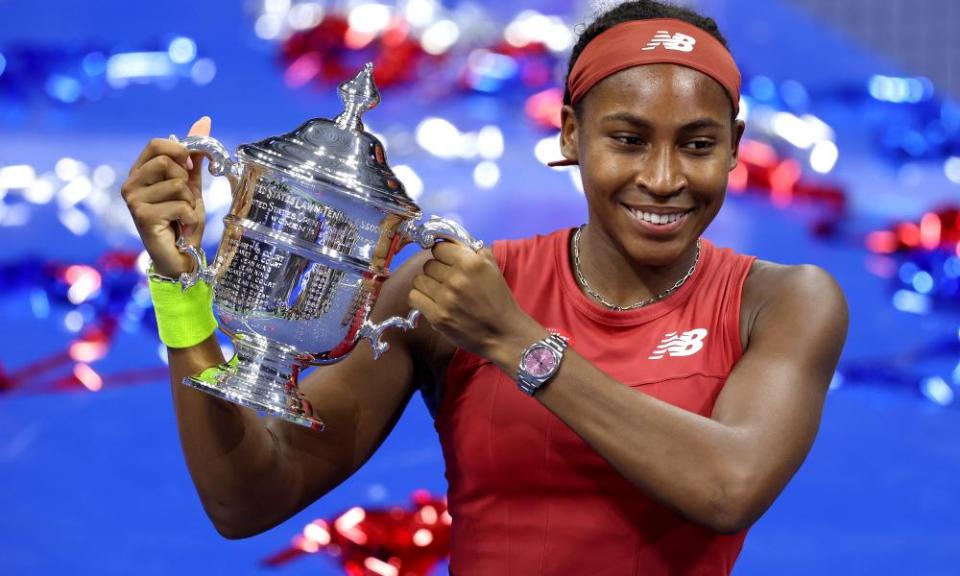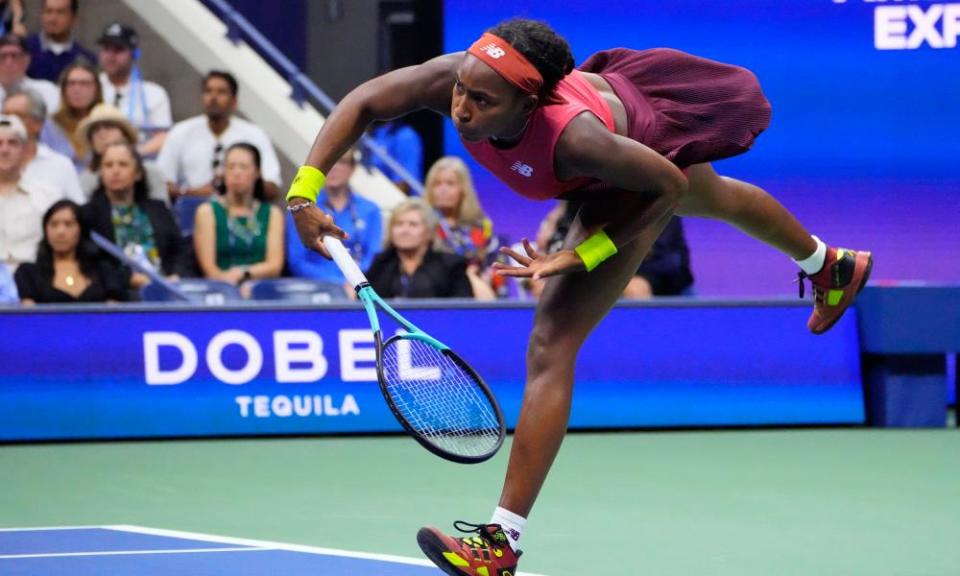Coco Gauff battles back to stun Aryna Sabalenka and claim US Open title

Teenage prodigies don’t often live up to the hype. Even for those who were sufficiently talented in the first place, there are so many obstacles on the pathway to success, so many ways that a sporting career can be derailed.
Since her breakthrough as a 15 year-old four years ago, though, Coco Gauff’s supreme mental fortitude and emotional maturity have kept her on track and carried her all the way to the top. In the biggest match of her life against the best player in the world, Gauff drew upon those qualities once more as she brilliantly recovered from a one-set deficit to topple Aryna Sabalenka, the second seed, 2-6, 6-3, 6-2.
Related: San Diego’s Katherine Hui wins US Open girls’ title as unseeded wildcard
With her first grand slam title, the 19-year-old completed an astonishing, dominant hard court swing that immediately followed her painful first round exit at Wimbledon. Having set her expectations so high at SW19, Gauff was tearful after her loss to Sofia Kenin. After her victory here at Flushing Meadows, she said the loss made her doubt whether she would ever win a major title. “I just felt like people were, like, ‘Oh, she’s hit her peak and she’s done. It was all hype.’” she said.
Every other week since has seen Gauff better her best triumph, winning the Washington WTA 500 event, then Cincinnati, a WTA 1000 tournament, before closing off the summer with the ultimate goal: holding the US Open trophy in her hands.
Gauff is the third American teenager to win the US Open women’s title, following in the footsteps of her idol Serena Williams, who won for the first time in 1999. She has now won 12 matches in succession and 18 of her last 19 since that Wimbledon defeat. After the summer of Coco, the sixth seed will rise to a new career high of No 3 in the WTA rankings.
“[Venus and Serena] are the reason why I have this trophy today, to be honest,” she said. “They have allowed me to believe in this dream growing up.”

Even before the tournament began, this was Gauff’s event. Her face was plastered on adverts, flyers and the side of buses across New York City. Fans and celebrities alike were coming only for her. As she entered the court ahead of her higher-ranked opponent, the crowd received her with a standing ovation.
Over the past year, Gauff has frequently spoken about her need to play more offensive tennis in order to take the next step in her career. But her first major title will go down as a total clinic in defensive tennis. After being outhit by Sabalenka throughout the first set, her forehand faltering and dropping short, she started the second set by finding more precision on her serve.
Meanwhile, she lit up the stadium with her incredible movement and anticipation, chasing down every last ball, deflecting Sabalenka’s blows into difficult spots on the court and eliciting countless errors from her opponent. As Gauff’s forehand began to hold up under pressure and respond with greater depth, it was Sabalenka’s forehand that began to hemorrhage errors.
Having established the momentum going into the third set, Gauff ran with it until the end. She quickly established a 4-1 lead with a double break and even after dropping serve following Sabalenka’s medical timeout, she was not to be stopped. She immediately broke back and served out an incredible victory.
After collapsing to the ground in shock, Gauff climbed into the crowd and embraced her family and team. In her speech, Gauff laughed at her father, noting that this was the first time she had ever seen him cry, and she joked about her brother not accepting her facetime call after the match. Then she thanked the people who didn’t believe in her.
“A month ago, I won a 500 title and people said I would stop at that,” she said. “Two weeks ago, I won a 1000 title and people were saying that was the biggest it was gonna get. Three weeks later, I’m here with this trophy right now. I tried my best to carry this with grace and I’ve been doing my best. Honestly, to those who thought they were putting water in my fire, you were really adding gas to it. And now I’m really burning so bright.”
In her press conference, Gauff said that she had even used the negative comments as motivation moments before the final: “I’m an argumentative person,” she said, smiling. “I’m very stubborn. My parents know. If they tell me one thing, I like to do the other. So I really told myself, literally up until, like, 10 minutes before the match, I was just reading comments of people saying I wasn’t going to win today. That just put the fire in me.”
On Monday, Sabalenka will rise to No 1 for the first time in her career, usurping Iga Swiatek. While the Belarusian was complimentary of Gauff, her play and her defence, she expressed frustration at her own error-strewn performance: “The good news is that it’s me against me. The bad one is that I’m still having these issues playing against myself, I would say,” she said.
After enjoying such unparalleled success in her youth, breaking records throughout, Gauff’s pathway to this defining moment in her career has been fascinating. Since her emergence at the age of 15, she has had to learn how to lose, to take the correct lessons from defeat and to understand that she is on her own path in her own time.
The hype and pressure on her shoulders has, at times, seemed suffocating yet she has shouldered that burden with incredible poise.
Earlier this year, when her progress briefly stagnated, Gauff was the first to recognise that changes might be necessary for her to fulfil her lofty goals. With her difficulties came some criticism, particularly months of discourse over the evolution of her forehand, but Gauff managed to block out the noise and focus on finding the right people to support her. She hired Brad Gilbert, former coach of Andre Agassi, and Pere Riba as her new coaches.
“Now I just realise that I just need to go out there and try my best,” she said. “It was to the point where I remember I lost when I was 17 and there was a stat, they were like, ‘Oh, she’s not going to win a slam before Serena’s age.’ It was stuff like that , I felt like I had a time limit on when I should win one, and if I won one after a certain age it wouldn’t be an achievement. It’s just crazy the amount of things that I have heard or seen about myself, but I’m really happy with how I’ve been able to manage it all.”
Earlier in the tournament, Gauff admitted that she didn’t expect to perform at such a high level so soon after Wimbledon – she thought she wouldn’t see significant improvements until the off-season. But she has worked hard with ample perspective, and as a result of her efforts, her dream scenario played out on Saturday night as the ground shook in Arthur Ashe Stadium.
